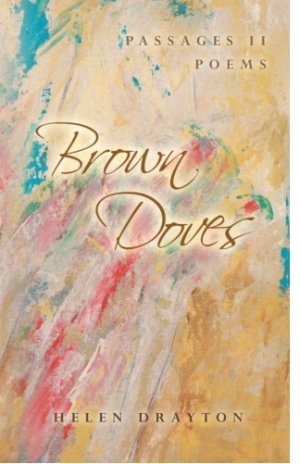Passages II
Brown Doves
Painter, poet, novelist, and Trinidad and Tobago Senator Helen Drayton follows her debut collection, Passages I, with Passages II: Brown Doves, seventy-two poems that contemplate love, friendship, homeland, and beauty in nature. Drayton is at her best, however, in work that ventures beyond familiar inspirations to examine island life as well as female personas. Highlights include “Knock Meh Down,” in which a local woman regards others with defiance; “The Warrior Queen,” a portrait of an aging mother as recounted by her daughter; and “The Shepherdess,” a poem with compelling repetitions.
When Drayton employs tactile detail, the poems offer imaginative vistas, but abstractions occasionally cloud the work. Her more confident lines, such as “the old milk tins in which they keep their bait / of silver Joshua fish” and “Brown doves, kiskadees, and red cardinals / sip dew from breadfruit leaves” turn observations into rhythmic evocations of the Caribbean.
In contrast, the briefest poems adopt a declarative stance less rooted in imagery. These include “Passions,” a plainspoken two-line reflection (“Passions are satisfied. / Compassion thirsts.”), “Love” (“Love’s the rhythm / of intermingling emotions. / A synergy of yearnings / to be compassionate.”), and “Tomorrow of Now” (“Happiness lives / in the tomorrow of now. / Find it / before today fades.”). Arguably, the book’s focus could be further concentrated without the inclusion of these and similar poems. Still, readers who appreciate extreme concision may regard them as pearls of wisdom placed at regular intervals.
Not all of the poems examine landscapes, relationships, or the philosophical problem of pain and finding purpose in life. The poet broaches harsh realities with subtlety, with mention of a choir who “had defied the dogged drag of graves” in the poem entitled “Remembering Haiti”; world events in “Refugees”: “Somewhere else, flapping wings overshadow UN tents”; and references to British colonialism in “Brown Doves”: “a hangover from Britishness – anti-imperialists / would say, brutishness…” In “Football,” she makes an extended analogy between world politics and a game in which “Left-wingers tackle right wingers / who back-tackle left-wingers.”
Drayton’s range extends beyond her choice of topics to include an egalitarian approach toward language. Musical dialect mixes with occasionally precious phrasing, such as “beatific smile” and “Cupid’s borrowed bow,” and images of everyday life (“mangos 4 fuh $7.00”) are juxtaposed with cultural references to Marley’s “Redemption Song” and Hyarima’s God Tamosi, as well as several references to Ra.
Passages II is ultimately a pleasing if uneven glimpse at the work of a promising new voice. The collection is accompanied by eight (including the cover) of the author’s well-balanced and tasteful impressionistic paintings.
Reviewed by
Karen Rigby
Disclosure: This article is not an endorsement, but a review. The publisher of this book provided free copies of the book and paid a small fee to have their book reviewed by a professional reviewer. Foreword Reviews and Clarion Reviews make no guarantee that the publisher will receive a positive review. Foreword Magazine, Inc. is disclosing this in accordance with the Federal Trade Commission’s 16 CFR, Part 255.

